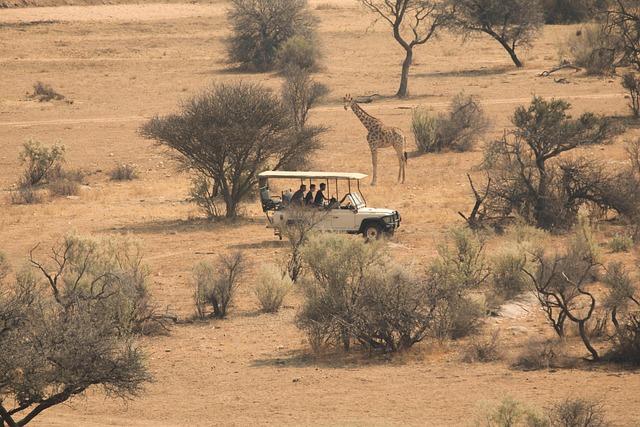As World Refugee day shines a spotlight on the plight of displaced populations worldwide, the International Rescue Committee (IRC) has issued a stark warning regarding the escalating crisis in West Africa.In a region already grappling with the dual challenges of armed conflict adn the devastating effects of climate change,nearly 9 million individuals have been uprooted from their homes,facing dire humanitarian conditions. This alarming statistic underscores the urgent need for global attention and intervention as the intricate interplay of natural disasters and ongoing violence continues to exacerbate the vulnerabilities of communities across nations such as Nigeria, Burkina Faso, and Mali. As the situation deteriorates, the IRC calls for a concerted response to address the humanitarian needs of the displaced, highlighting the broader implications for regional stability and the international community’s responsibility to aid those in distress.
The Alarming Displacement Crisis in West Africa Driven by Conflict and Climate Change
west Africa is currently gripped by a crisis that has forced nearly 9 million individuals to flee their homes due to intertwined factors of violent conflict and escalating climate change. The International Rescue Committee (IRC) has highlighted that such displacement is not merely a statistic but a heartbreaking reality affecting families and communities. In regions like Nigeria, Burkina Faso, and Mali, armed groups have intensified their activities, leading to increased violence and insecurity. Simultaneously, changing weather patterns are exacerbating food shortages, contributing to the desperation that pushes people to leave everything behind. The repercussions are profound, with many displaced individuals facing limited access to essential services, including healthcare, education, and shelter.
The scale and complexity of this crisis demand urgent attention and action from the global community. The IRC warns that as conflict zones expand and climate-related disasters become more frequent, vulnerable populations are left with few options. Situations are dire, with many displaced individuals residing in overcrowded camps or informal settlements where basic human needs go unmet. Key elements driving increased vulnerability include:
- Escalating armed conflict causing widespread fear and instability
- Severe droughts and flooding leading to agricultural collapse
- Lack of access to clean water and sanitation
- inadequate humanitarian aid and support systems
To better understand the impact of this displacement on affected nations, consider the following table that summarizes key statistics:
| Country | Displaced Individuals (millions) | Primary Causes |
|---|---|---|
| Nigeria | 3.4 | Conflict, Climate Change |
| Burkina Faso | 1.7 | Conflict |
| Mali | 1.3 | Conflict |
| Niger | 1.2 | Climate Change |
Impact of Displacement on Vulnerable Populations in the Region
The recent surge in displacement due to conflict and climate change in West Africa has exacerbated the vulnerabilities faced by numerous communities. With nearly 9 million individuals uprooted from their homes, the repercussions are profound, affecting not only personal safety but also the core social structures of society. Vulnerable populations, including women, children, and the elderly, are especially at risk as they navigate hostile environments with limited resources. Key challenges include:
- Limited access to healthcare: Displaced individuals often find themselves without necessary medical services, leading to increased morbidity rates, particularly among children.
- Food insecurity: The disruption of local economies means many are left without reliable access to food, heightening malnutrition rates.
- Psycho-social trauma: The experiences related to displacement, violence, and loss contribute to long-lasting mental health issues.
Understanding the multifaceted impact requires not only immediate humanitarian responses but also long-term strategies tailored to the needs of these populations. Enhanced support systems focusing on education, livelihood opportunities, and health care access are essential for rebuilding lives and communities. The table below summarizes the main vulnerable groups affected by displacement and their associated challenges:
| Vulnerable Group | Challenges Faced |
|---|---|
| Women | Increased risk of gender-based violence and economic marginalization |
| Children | Disruption of education and heightened vulnerability to exploitation |
| Elderly | Isolation and lack of tailored health services |
The Role of International Aid Organizations in Crisis Response
The ongoing crises in West Africa, exacerbated by both conflict and climate change, have resulted in a staggering displacement of nearly 9 million individuals, highlighting the critical need for intervention from international aid organizations. These entities play an indispensable role in providing emergency relief and support to affected populations. International Rescue Committee (IRC), among others, has been at the forefront, delivering essentials such as food, healthcare, and shelter to those who have lost everything. Their efforts are crucial not only in immediate response but also in the long-term recovery and resilience-building of communities.
International aid organizations operate through a multifaceted approach, strategizing for maximum impact. Key elements of their role include:
- Emergency Relief: Providing immediate assistance to displaced populations, including food and medical care.
- Coordination with Local Authorities: Collaborating with governmental and local partners to ensure effective delivery of aid.
- Advocacy: Raising awareness about the needs of displaced communities and pressing for policy changes.
- Long-term development Initiatives: Implementing programs that focus on rebuilding and enhancing community resilience.
Through these complex efforts, international aid organizations are not just addressing immediate needs but are also laying the groundwork for a lasting future, ensuring that vulnerable populations have the assistance and support they require to rebuild their lives.
Urgent Recommendations for Policy Makers to Address the humanitarian Needs
Considering the alarming situation unfolding in West Africa, it is critical for policy makers to take immediate and decisive action to alleviate the humanitarian crisis affecting nearly 9 million displaced individuals. Strategic investments should focus on enhancing resilience against both conflict and climate change through complete programs that address underlying vulnerabilities. This involves increasing funding for local and international ngos that provide emergency assistance, psychosocial support, and essentials like food, clean water, and shelter. Furthermore, coordinated diplomatic efforts are essential to promote peace and stability in conflict-prone areas, fostering long-term solutions that protect displaced populations and their communities.
To effectively respond to this urgent crisis, policy makers must prioritize policies that bolster community-based initiatives and ensure inclusive participation of affected populations in decision-making processes. Implementing interventions such as educational programs and vocational training can empower displaced individuals,promoting self-reliance and reducing dependency on aid. Additionally, collaboration with regional leaders and international organizations is vital in addressing the cross-border implications of displacement. A commitment to sustainable development and environmental protection can help tackle the root causes of displacement, thus enabling a holistic approach to this unprecedented humanitarian need.
Highlighting Success Stories: community Resilience Amidst Adversity
Despite the turmoil that has led to the displacement of nearly 9 million individuals across West Africa, stories of community resilience shine through as beacons of hope. Local organizations, supported by international aid groups like the IRC, have come together to create support networks that empower those affected by conflict and climate change. These initiatives focus on not only providing immediate relief—such as food,shelter,and medical care—but also fostering long-term stability through education,skills training,and community rebuilding efforts.This holistic approach strengthens social bonds and encourages self-sufficiency among displaced populations.
Among the notable success stories is a grassroots initiative in Mali, where local farmers, despite facing severe resource scarcity, have banded together to share tools and techniques that enhance their agricultural resilience. These efforts have led to increased crop yields and improved food security. In Nigeria, communities have leveraged technology to create platforms for sharing information, enabling quicker responses to emergencies and ensuring that marginalized voices are heard. These examples underscore not just survival but also the reclaiming of agency by communities, illustrating that even in the harshest environments, the spirit of collaboration and innovation can thrive.
Future Outlook: The Need for Sustainable Solutions to Prevent Further Displacement
The ongoing crisis in west Africa demands urgent and innovative approaches to address the root causes of displacement. As nearly 9 million people find themselves uprooted by escalating conflicts and the adverse effects of climate change, it is imperative to prioritize sustainable solutions that not only respond to immediate humanitarian needs but also promote long-term stability. Effective strategies must include:
- Investing in Climate Resilience: Implementing programs that strengthen local communities’ ability to adapt to environmental changes.
- Promoting Peacebuilding Initiatives: Fostering dialog and cooperation among conflicting parties to reduce violence.
- Supporting Livelihoods: Creating economic opportunities for displaced populations and host communities to mitigate poverty.
Moreover, collaboration between governments, NGOs, and international bodies is essential to develop comprehensive policies that encompass preventive measures. Establishing a robust framework for data collection and analysis will enable more targeted interventions and resource allocation. The integration of local knowledge and the participation of displaced communities in decision-making processes will also enhance the effectiveness of these solutions. A strategic continuous betterment approach can be summarized as follows:
| Action | Goal |
|---|---|
| Community Engagement | Empower locals in planning & implementation |
| cross-Sector Partnerships | Create comprehensive support networks |
| Innovative Funding Mechanisms | Ensure sustainable resource mobilization |
The Way Forward
as we observe World Refugee Day, the staggering statistics presented by the International Rescue Committee illuminate a pressing humanitarian crisis in West Africa. With nearly 9 million individuals displaced due to the dual pressures of conflict and climate change, the need for immediate intervention and sustained support has never been clearer. The compounding effects of violence and environmental degradation not only threaten the lives and livelihoods of millions but also challenge the resilience of entire communities.
This crisis underscores the urgent call for action from the international community, policymakers, and humanitarian organizations alike. As we confront the realities faced by those uprooted from their homes,it is imperative that we recognize our shared responsibility to advocate for effective solutions and provide aid to those in desperate need. The journey towards recovery and stability remains daunting, yet through collective effort and commitment, we can work towards restoring hope and dignity to those affected by this unprecedented upheaval.On this pivotal day, let us reaffirm our dedication to safeguarding the rights and futures of refugees everywhere.

